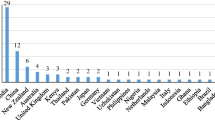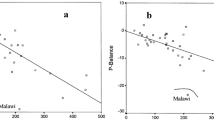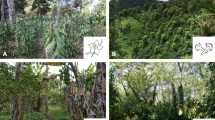Abstract
Climate change in developing nations has become a severe obstacle to extensive land productivity. Farmer's resilience to climate change impact can be boosted via adaptation measures. Smallholder farmers' expertise, however, can be fragmented and inconsistent, especially in times of climatic stress. It is worth mentioning that social networks play a part in how farmers decide how to adapt. Formal and informal social ties are the categories we use to categorize social networks. Using primary data obtained from banana growers on the island of Ngazidja in the Comoros archipelago, this study need to analyze the variable effects of social ties on farmers' adaptation decisions and further assess the impact of adaptation strategies on land productivity under climate change. According to the findings, less than 32% of banana growers used adaptation measures to lessen the effects of climate change on agricultural practices. Banana producers favored replanting trees, boosting sucker reduction, improving irrigation, and mixing crops. Farmers applied adaptation tactics at a higher rate when they were members of agricultural cooperatives and connected to sellers of agricultural inputs. The connection to local farmers, on the other hand, prevented farmers from taking proactive measures to counteract climate change. We also revealed that banana producers' land production increased dramatically due to adaptation measures. These results illustrate the significance of smallholder farmers' various social connections when formulating a policy package to improve land productivity and increase their responses to climate change.






Similar content being viewed by others
Data availability
The data that support the results of this study, are available from the corresponding author, upon reasonable request.
References
Andlia A., Luce C., Mohammad Nabil H., (2022). An assessment of the factors that influence the development of fusarium wilt epidemics in Banana. Asian Journal of Plant and Soil Sciences.
Abdoussalami, A., Hu, Z., Islam, A. R. M. T., & Wu, Z. (2023). Climate change and its impacts on banana production: a systematic analysis. Environment, Development and Sustainability, pp.1-30.
Abid, M., et al. (2020). Ex-Ante and ex-post coping strategies for climatic shocks and adaptation determinants in Rural Malawi. Climate Risk Management.
Arbuckle, J. G., Jr., Morton, L. W., & Hobbs, J. (2015). Understanding farmer perspectives on climate change adaptation and mitigation: the roles of trust in sources of climate information, climate change beliefs, and perceived Risk. Environment and Behavior, 47(2), 205–234.
Bryan, E., Ringler, C., Okoba, B., Roncoli, C., Silvestri, S., & Herrero, M. (2013). Adapting agriculture to climate change in Kenya: household strategies and determinants. Journal of Environmental Management, 114, 26–35.
Campbell, (2021). Union of the comoros: establishment of four weather stations for better resilience to climatic hazards. https://www.campbellsci.com/union-comoros-weather-stations.
Chakraborty, U., & Bhat, S. (2018). The effects of credible online reviews on brand equity dimensions and its consequence on consumer behavior. Journal of Promotion Management, 24(1), 57–82.
Doran, E. M., Zia, A., Hurley, S. E., Tsai, Y., Koliba, C., Adair, C., & Méndez, V. E. (2020). Social-psychological determinants of farmer intention to adopt nutrient best management practices: implications for resilient adaptation to climate change. Journal of Environmental Management, 276, 111304.
Dube, K., Chapungu, L., & Fitchett, J. M. (2021). Meteorological and climatic aspects of cyclone Idai and Kenneth. Cyclones in Southern Africa: Volume 2: Foundational and Fundamental Topics, 19-36.
Esfandiari, M., Khalilabad, H. R. M., Boshrabadi, H. M., & Mehrjerdi, M. R. Z. (2020). Factorsinfluencing the use of adaptation strategies to climate change in paddy lands of Kamfiruz Iran. Land Use Policy, 95, 104628.
Faisal, M., Abbas, A., Xia, C., Raza, M. H., Akhtar, S., Ajmal, M. A., & Cai, Y. (2021). Assessing small livestock herders’ adaptation to climate variability and its impact on livestock losses and poverty. Climate Risk Management, 34, 100358.
Food and Agriculture Organization of the United Nations. (2021)
Hasan, M. K., & Kumar, L. (2019). Comparison between meteorological data and farmer perceptions of climate change and vulnerability in relation to adaptation. Journal of Environmental Management, 237, 54–62.
Housseni, H., Roushnaty, Y., Mohamed, F., Lahcen, Z., (2021). Study of the incidence of black leaf streak disease (BLSD) On Banana in The Comoros. Journal of Xi’an Shiyou University, Natural Science Edition.
IFRC (2020). Comoros: tropical cyclone kenneth emergency appeal (MDRKM007) final report. https://reliefweb.int/report/comoros/comoros-tropical-cyclone-kenneth-emergency-appeal-mdrkm007-final-report.
Ingold, Karin. (2017). How to create and preserve social capital in climate adaptation policies: a network approach. Ecological Economics.
International Monetary Fund. (2013). Union of the comoros: Poverty reduction strategy paper�review of the second year of implementation. IMF Staff Country Reports.
Khan, I., Lei, H., Shah, I. A., Ali, I., Khan, I., Muhammad, I., & Javed, T. (2020). Farm households’ risk perception, attitude and adaptation strategies in dealing with climate change: Promise and perils from rural Pakistan. Land Use Policy, 91, 104395.
Macrotrends. (2023). Comoros population 1950–2023. https://www.macrotrends.net/countries/COM/comoros/population.
Moniruzzaman, S., (2015). Crop choice as climate change adaptation: Evidence from Bangladesh. Ecological Economics.
Ngigi, M. W., Mueller, U., & Birner, R. (2017). Gender differences in climate change adaptation strategies and participation in group-based approaches: An intra-household analysis from Rural Kenya. Ecological Economics, 138, 99–108.
Nguyen, T. P. L., Seddaiu, G., & Roggero, P. P. (2019). Declarative or procedural knowledge? Knowledge for enhancing farmers’ mitigation and adaptation behaviour to climate change. Journal of Rural Studies, 67, 46–56.
Nthambi, M., Markova-Nenova, N., & Wätzold, F. (2021). Quantifying loss of benefits from poor governance of climate change adaptation projects: A discrete choice experiment with Farmers in Kenya. Ecological Economics, 179, 106831.
Ojo, T. O., & Baiyegunhi, L. J. S. (2021). Climate change perception and its impact on net farm income of smallholder rice farmers in South-West. Nigeria. Journal of Cleaner Production, 310, 127373.
Pradeepkiran, J. A. (2019). Aquaculture role in global food security with nutritional value: A review. Translational Animal Science, 3(2), 903–910.
Quiroga, S., Suárez, C., Solís, J. D., & Martinez-Juarez, P. (2020a). Framing vulnerability and coffee farmers’ behaviour in the context of climate change adaptation in Nicaragua. World Development, 126, 104733.
Rahman, S., & Anik, A. R. (2020). Productivity and efficiency impact of climate change and agroecology on Bangladesh agriculture. Land Use Policy, 94, 104507.
Sahu, N. C., & Mishra, D. (2013). Analysis of perception and adaptability strategies of the farmers to climate change in Odisha, India. APCBEE Procedia, 5, 123–127.
Saptutyningsih, E., Diswandi, D., & Jaung, W. (2020). Does social capital matter in climate change adaptation? A lesson from agricultural sector in Yogyakarta. Indonesia. Land Use Policy, 95, 104189.
Shikuku, K. M. (2019). Information exchange links, knowledge exposure, and adoption of agricultural technologies in Northern Uganda. World Development, 115, 94–106.
Silvestri, S., Bryan, E., Ringler, C., Herrero, M., & Okoba, B. (2012). Climate change perception and adaptation of agro-pastoral communities in Kenya. Regional Environmental Change, 12, 791–802.
Stričević, R., Srdjević, Z., Lipovac, A., Prodanović, S., Petrović-Obradović, O., Ćosić, M., & Djurović, N. (2020b). Synergy of experts’ and farmers’ responses in climate-change adaptation planning in serbia. Ecological Indicators, 116, 106481.
Swami, D., & Parthasarathy, D. (2020). A multidimensional perspective to farmers’ decision making determines the adaptation of the farming community. Journal of Environmental Management, 264, 110487.
Takakura, J. Y., Fujimori, S., Hanasaki, N., Hasegawa, T., Hirabayashi, Y., Honda, Y., & Hijioka, Y. (2019). Publisher correction: Dependence of economic impacts of climate change on anthropogenically directed pathways. Nature Climate Change, 9(11), 894–894.
Tejada, J. J., & Punzalan, J. R. B. (2012). On the misuse of Slovin’s formula. The Philippine Statistician, 61(1), 129–136.
The World Bank. (2020). World Bank Group Annual Report 2020: Supporting Countries in Unprecedented Times.
Thinda, K. T., Ogundeji, A. A., Belle, J. A., & Ojo, T. O. (2020). Understanding the adoption of climate change adaptation strategies among smallholder farmers: Evidence from land reform beneficiaries in South Africa. Land Use Policy, 99, 104858.
Tran, T. A., Nguyen, T. H., & Vo, T. T. (2019). Adaptation to flood and salinity environments in the vietnamese mekong delta: Empirical analysis of farmer-Led innovations. Agricultural Water Management, 216, 89–97.
Trinh, T. Q., Rañola, R. F., Jr., Camacho, L. D., & Simelton, E. (2018). Determinants of farmers’ adaptation to climate change in agricultural production in the central region of Vietnam. Land Use Policy, 70, 224–231.
Union of Comoros. (2019). IMF Staff Country Reports.
Vose, James M., David L.P., Toral PW. (2012). Effects of climatic variability and change on forest ecosystems: A comprehensive science synthesis for the US forest sector. Forest Service General Technical Report.
Worldometer. (2023). Population of Comoros. https://www.worldometers.info/world-population/comoros-population/#:~:text=The current population of Comoros, of the total world population.
Zhang, H., Mu, J. E., & McCarl, B. A. (2018). Adaptation to climate change via adjustment in land leasing: Evidence from dryland wheat farms in the US Pacific Northwest. Land Use Policy, 79, 424–432.
Zhang, M., Zhang, D., Qi, Q., Tong, S., Wang, X., An, Y., & Lu, X. (2022). Flooding effects on population and growth characteristics of bolboschoenus planiculmis in momoge Wetland, Northeast China. Ecological Indicators, 137, 108730.
Acknowledgements
The authors want to thank all friends and colleagues who participated in this investigation, especially the Comoros's National Agency for Civil Aviation and Meteorology.
Author information
Authors and Affiliations
Contributions
Andlia Abdoussalami was involved in conceptualization, investigation, methodology, software, and writing—original draft preparation. Zhenghua Hu was responsible for conceptualization, methodology, investigation, supervision, and writing—reviewing and editing. ARM Towfiqul Islam contributed to conceptualization, methodology, investigation, supervision, and writing—reviewing and editing. Bouhari Ahamada Djae took part in conceptualization and investigation, and supplemented the manuscript. All authors commented on the manuscript draft and approved the submission.
Corresponding authors
Ethics declarations
Conflict of interest
None of the authors has any conflict of interest to declare.
Ethical approval
Not applicable.
Consent to participate
All authors agreed to contribute to this study.
Consent to publish
Not applicable.
Additional information
Publisher's Note
Springer Nature remains neutral with regard to jurisdictional claims in published maps and institutional affiliations.
Rights and permissions
Springer Nature or its licensor (e.g. a society or other partner) holds exclusive rights to this article under a publishing agreement with the author(s) or other rightsholder(s); author self-archiving of the accepted manuscript version of this article is solely governed by the terms of such publishing agreement and applicable law.
About this article
Cite this article
Abdoussalami, A., Hu, Z., Islam, A.R.M.T. et al. Role of social network on banana farmer's adaptation to climate change and land productivity in Ngazidja island, Comoros archipelago. Environ Dev Sustain (2023). https://doi.org/10.1007/s10668-023-03626-x
Received:
Accepted:
Published:
DOI: https://doi.org/10.1007/s10668-023-03626-x




